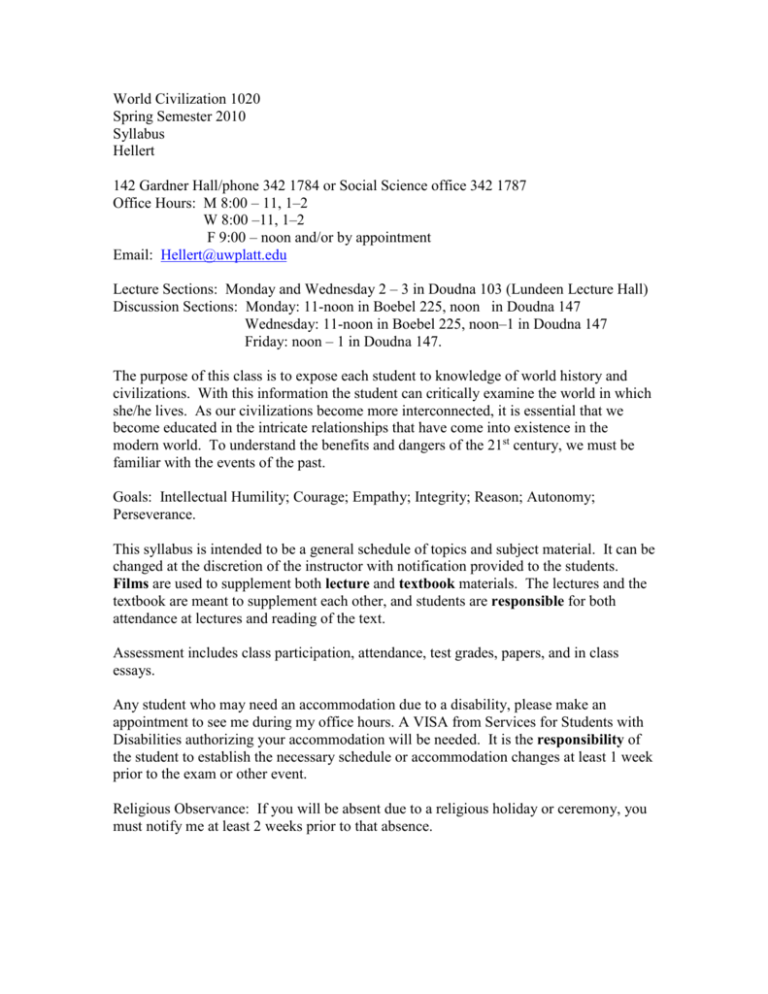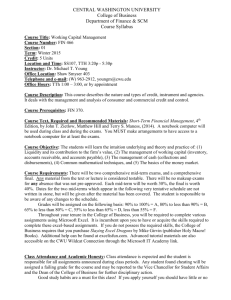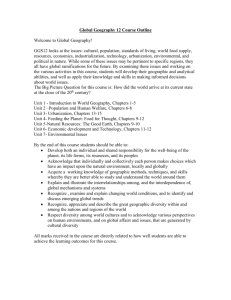World Civilization 102
advertisement

World Civilization 1020 Spring Semester 2010 Syllabus Hellert 142 Gardner Hall/phone 342 1784 or Social Science office 342 1787 Office Hours: M 8:00 – 11, 1–2 W 8:00 –11, 1–2 F 9:00 – noon and/or by appointment Email: Hellert@uwplatt.edu Lecture Sections: Monday and Wednesday 2 – 3 in Doudna 103 (Lundeen Lecture Hall) Discussion Sections: Monday: 11-noon in Boebel 225, noon in Doudna 147 Wednesday: 11-noon in Boebel 225, noon–1 in Doudna 147 Friday: noon – 1 in Doudna 147. The purpose of this class is to expose each student to knowledge of world history and civilizations. With this information the student can critically examine the world in which she/he lives. As our civilizations become more interconnected, it is essential that we become educated in the intricate relationships that have come into existence in the modern world. To understand the benefits and dangers of the 21st century, we must be familiar with the events of the past. Goals: Intellectual Humility; Courage; Empathy; Integrity; Reason; Autonomy; Perseverance. This syllabus is intended to be a general schedule of topics and subject material. It can be changed at the discretion of the instructor with notification provided to the students. Films are used to supplement both lecture and textbook materials. The lectures and the textbook are meant to supplement each other, and students are responsible for both attendance at lectures and reading of the text. Assessment includes class participation, attendance, test grades, papers, and in class essays. Any student who may need an accommodation due to a disability, please make an appointment to see me during my office hours. A VISA from Services for Students with Disabilities authorizing your accommodation will be needed. It is the responsibility of the student to establish the necessary schedule or accommodation changes at least 1 week prior to the exam or other event. Religious Observance: If you will be absent due to a religious holiday or ceremony, you must notify me at least 2 weeks prior to that absence. Attendance is required and necessary. Low grades are almost always associated with poor attendance. There is no need to notify me of absences. The only “excused” absences are for University sanctioned events. You may make up work for these absences. You may also attend an alternate discussion to make up any missed work if you receive approval from the instructor. If an extended absence is required due to illness, injury, or family emergency, the student must notify the instructor and arrange necessary accommodations. Any late assignment will receive one letter grade lower (than if received on time) for each class period it is late. If an emergency requires other arrangements, they are the responsibility of the student. Grading: Grading is achieved on a % basis of the total points available. Please keep a record of your own grades. 90% - 100% = A 80% - 89% = B 70% - 79% = C 60% - 69% = D 59% and lower = F Exams: There are 3 objective exams – 100 points each. There will be a quiz during each discussion session. 150-200 points total. Discussion section work: Each discussion section will revolve around pertinent question or topic as covered in the lecture component of the class. Each student must be prepared to contribute within the discussion. Each film will require a written critique. Terms for each Lecture session will be listed on D2L under the content for the Lecture section. The final exam is the third objective exam (not comprehensive) so it is required of all students. All written work must be typed and double spaced. All rules of English composition apply and are graded. If these requirements are not met, the assignment will not be graded. Extra Credit: Each section has an extra credit project involving quotes and their authors. These quotes are worth 1 point each and a total of 10 quotes are permitted with each exam. Quotes from the time period of an earlier exam are not allowed on the next exam. There will be no other extra credit offered during or after the semester. Each student is responsible for his/her grade by completing the assigned work. Common rules of civility apply during this class. There is no swearing or intimidation of any kind. Cheating will result in the immediate failure of the class and possible expulsion from the University. Textbook: Civilization Past and Present, 11th edition by Brummett, et al. Chapters 18-35 Supplementary text: Life and Death in Shanghai by Nien Cheng Lectures and Exams: These topics correspond to the chapters and/or pages listed. Students should have read the material before attending class. January 20 & 25 – Enlightenment and Scientific Revolution (18) January 27 – American Revolution (21) February 1 & 3 – French Revolution and Napoleon (18) February 8 -Africa and Asia to 1815 (19, 20) February 10 – Industrial Revolution (22) February 15 Exam #1 Chapters 18-22 in Discussions February 17 Exam # 1 Chapters 18-22 in Discussions February 19 Exam # 1 Chapters 18-22 in Discussion February 15 - African and the Middle East to 1914 (23) February 17-22 – Asia to 1914 (24) February 24-March 1 – Europe after 1815 through revolutions of 1848 (26) March 3-8 – Crimean War, Unification of Italy and Germany, Toward War (26) March 10 – 22 World War I (27) March 13 – 21 Spring Break March 24 Exam #2 Chapters 23-27 in Discussions March 26 Exam #2 Chapters 23-27 in Discussions March 29 Exam #2 Chapters 23-27 in Discussion March 24–29-31 USSR, Italy, Germany, Japan between the Wars of the 20th Century (28) April 1 – Asia World War I to Cold War (29) No classes on April 2 and April 5. April 7 – Middle East and Africa after World War I to 1945 (30) April 12-14-19 – World War II April 21-26 – Cold War (Chapters 31, 32) April 28- Middle East and Africa since 1945 (34) May 3-5 - Asia since 1945 (35) This will include and exam over Life and Death in Shanghai. Exam # 3 May 13, Thursday 5-6:52 pm. Chapters 28-35 (This date/time may be changed due to scheduling rooms for exams.)






